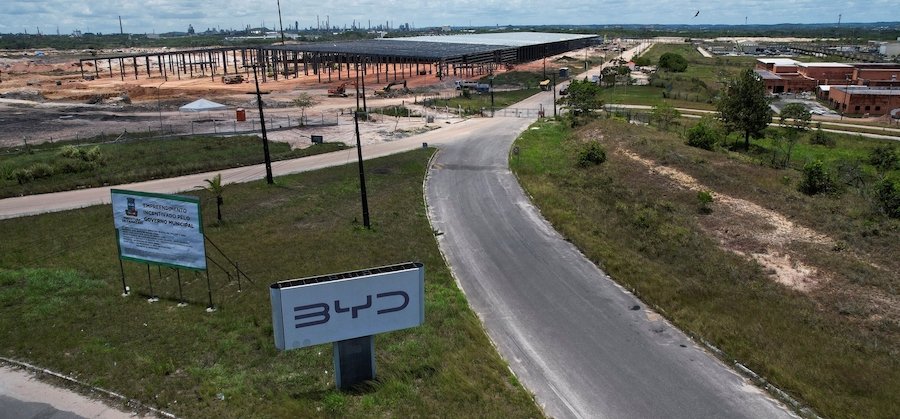Brazilian Prosecutors Sue BYD Over “Slave-Like” Work Conditions at Factory Site

One of the world’s most prolific automakers, the Chinese giant BYD, has been formally accused by Brazilian authorities in a newly filed lawsuit of subjecting its workers to what they described as being akin to modern slavery and engaging in international human trafficking. The suit, which is being filed against BYD and two contractors, JinJiang and Tecmonta, seeks 257 million reais (~$50 million) in damages and individual restitution for the workers affected.
Withheld passports and crowded conditions are among the accusations
The suit itself stems from an investigation that started late last year, when the Public Labour Prosecutor’s Office (MPT) in the Brazilian state of Bahia halted work at the construction site of BYD’s new factory in Camaçari after they rescued a total of 220 Chinese nationals who were employed to help build the factory.
Authorities state that workers were subjected to abhorrent living and working conditions at the plant that they described back in December as “an alarming picture of precariousness and degradation,” where workers slept in crowded dormitories with bunk beds without mattresses and only one bathroom per every 31 workers; which forced them to wake up at 4 a.m. everyday to prepare for their 5:30 a.m. shifts at the site.
“All the accommodations shared serious infrastructure and hygiene problems,” the MPT wrote back in December, translated from Portuguese. “The bathrooms, in addition to being insufficient, were not separated by sex, did not have adequate toilet seats, and presented poor hygiene conditions. The lack of a suitable place to wash clothes led workers to use their own bathrooms for this purpose.”
In addition, the MPT wrote in its suit that due to the conditions that BYD and the two subcontractors subjected workers to, workers were at an increased risk of accidents due to the negligence of occupational health and safety standards at the site. In the MPT’s December 2024 report, they recorded that they recorded “several workplace accidents,” including one where a worker suffered an accident “due to sleep deprivation caused by inadequate housing conditions and long working hours,” as well as a worker who didn’t receive proper medical care following an eye injury.
The prosecutors also claimed that the BYD workers were brought to Brazil to build the factory without the proper visas, that their employers pocketed up to 70% of their wages, and subjected them to immense financial penalties to terminate their contracts. Many of the workers also had their passports taken away and worked under “employment contracts with illegal clauses, exhausting work hours, and no weekly rest.”
Brazilian law says that debt bondage and work that violates human dignity are defined as “slavery-like conditions.” In a statement seen by the Associated Press, BYD said that it is collaborating with Brazilian authorities and has been throughout the probe into its working conditions. The automaker also stated that it respects Brazilian law and international labor regulations. However, in December, BYD spokesperson Li Yunfei posted on Weibo that efforts were made to “smear” brands like BYD.
“In the matter of smearing Chinese brands, smearing China, and attempting to undermine the friendship between China and Brazil, we have seen how relevant foreign forces maliciously associate and deliberately smear,” Yunfei said about media reports about the situation.
Final thoughts
The BYD plant in Bahia was supposed to open in March, but the suit shows how much companies like BYD are willing to stick to a solid dollar and cents figure for foreign factories in emerging markets like Brazil. In a statement for Deutsche Welle, Paulo Feldmann, an economist and professor at the FIA Business School in Sao Paulo, found that BYD’s use of Chinese workers in Brazil is similar to how other Chinese companies operate in places like Africa and other Latin American countries. Still, they offer no tangible benefits to the local population.
“For Brazil, it would have been better if these workers had been local, because of the income they would have generated for themselves and their families, the positive impact on their communities, and the professional training they would have acquired. It would also be easier to monitor their working conditions,” he said.
Chinese labor conditions have been a pressing issue in other sectors besides construction and industrial factories. For instance, the 996 working hour system (which requires employees to work from 9:00 am to 9:00 pm, 6 days per week; or 72 hours per week, 12 hours per day) has been a significant issue surrounding major tech and internet companies in the country including Alibaba, Huawei and ByteDance, the parent company of TikTok.
Nouvelles connexes


